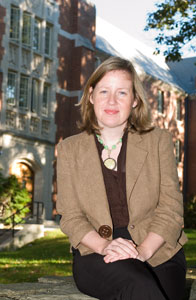  |
| HOME | THIS ISSUE | CALENDAR | GRANTS | BACK ISSUES | < BACK | NEXT > |
Human Rights Institute starts year with new faculty, conferenceby Michael Kirk - September 25, 2006 | ||||
| As the University's Human Rights Institute gears up for its annual fall conference and its students immerse themselves in research, the Institute welcomes a new faculty member to its ranks: Emma Gilligan, a native of Melbourne, Australia, began at UConn this semester with a joint appointment in the history department and the Human Rights Institute. After earning her Ph.D. at the University of Melbourne, followed by a three-year postdoctoral fellowship in the history department at the University of Chicago, Gilligan lived for four years in Moscow doing research for her doctoral degree and working with the Andrei Sakharov Foundation. Sakharov was a Soviet physicist who won the Nobel Prize in 1975. "My appointment at UConn is a perfect match for my interests," says Gilligan, who is writing a book on war crimes in the break-away republic of Chechnya. "It gives me the opportunity to teach my predominant research interests, which are Soviet history and human rights." She says her current project is an outgrowth of her book, Defending Human Rights in Russia, about the evolution of the Soviet human rights movement from the post-Stalin period to today. "[The Chechnya] conflict has been going on now for some 12 years and has devastated the region," she says. "At the moment, a great deal of my research for the book on Chechnya involves interviews with key public figures, human rights and humanitarian organizations, and Chechen political refugees." The book is to be published by Princeton University Press in 2008. Gilligan says her interest in the field of human rights grew as a result of reading Sakharov's memoirs. Sakharov turned to human rights activism in the 1970s, after seeing that the Soviet government was condoning nuclear testing, with severe biological and environmental implications. "This led him inevitably to human rights issues within the Soviet Union and, in particular, the severe restrictions on freedom of the press and expression," says Gilligan. "His level of self-reflection and courage were inspiring qualities. I became interested in trying to trace the resonance of his influence on the Soviet human rights movement, which grew up in the 1960s, and its evolution after the collapse of the Soviet Union in 1991." The Human Rights Institute is also helping fund the human rights research of students. Katharine Hawkins, a Ph.D. candidate in anthropology at UConn is one of them.
Hawkins is conducting a survey of UConn undergraduate students about how people conceive of justice and how those conceptions are formed. The survey is preliminary research for her dissertation fieldwork in Croatia on the International Tribunal for the Former Yugoslavia. "I spent the month of July in Croatia, mostly in the capital of Zagreb, but also on the coast in Zadar and Nin," says Hawkins. "I met many people who were interested in talking about the current political situation and the conflict. I am interested in understanding the impact on victims of attempts to resolve conflict after mass atrocities such as ethnic cleansing and genocide." She says the type of conflict resolution she is interested in is legal retribution, the development of international human rights law and courts. "I hope that my research will highlight the importance of taking a victim-centered approach to conflict resolution," she says. "Ultimately, it will have policy implications and aid in the design of future international tribunals." The Human Rights Institute's fall conference - "Humanitarian Responses to Narratives of Inflicted Suffering" - will take place Oct. 13-15 in Storrs. Richard Wilson, director of the Human Rights Institute, says the conference will analyze humanitarian responses to private and public narratives of politicized suffering that has been inflicted by states and private political groups, as well as by social conflict, colonialism, and apartheid. The main themes of the conference will be to understand the character, form, and voice of the narratives themselves, and to explain how and why some become part of political movements of solidarity and others do not. The conference will feature many speakers from around the country and the world, including Adam Nadel, a New York Times photographer nominated for a Pulitzer Prize for his work, and Carol Jacobsen from the University of Michigan, who made a documentary film about the treatment of women in U.S. prisons. For more about the Human Rights Institute and the conference, visit: http://www.humanrights.uconn.edu/conf_2006.htm.
|
| ADVANCE HOME UCONN HOME |

